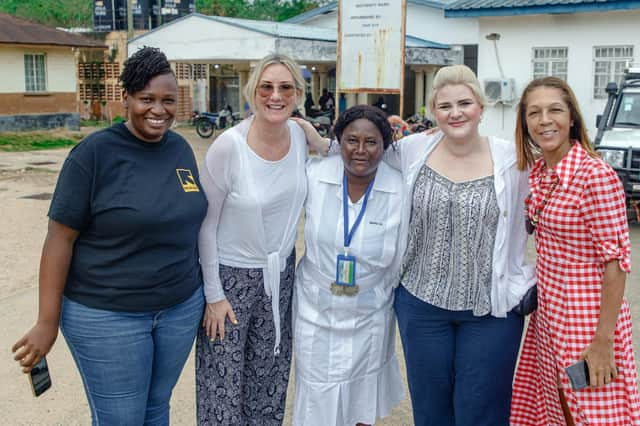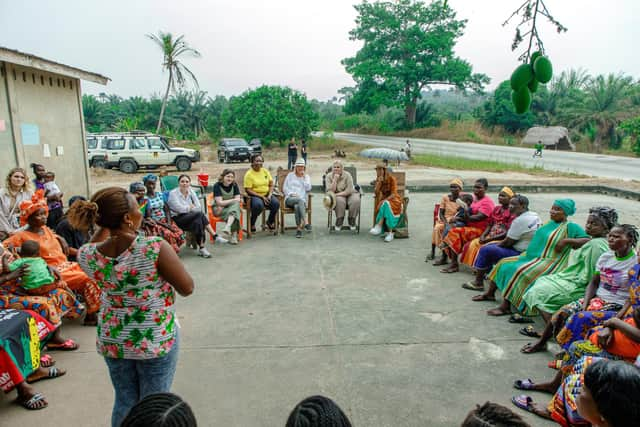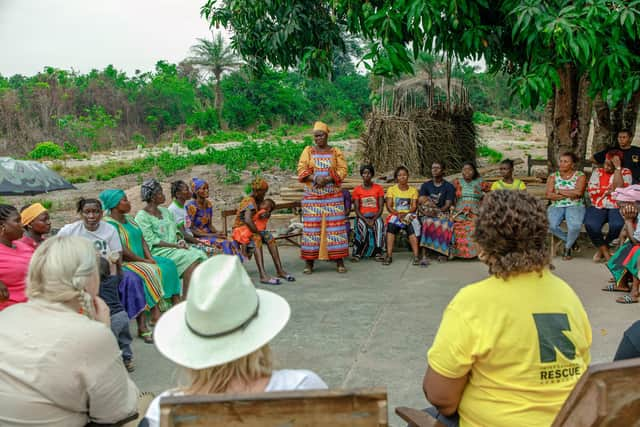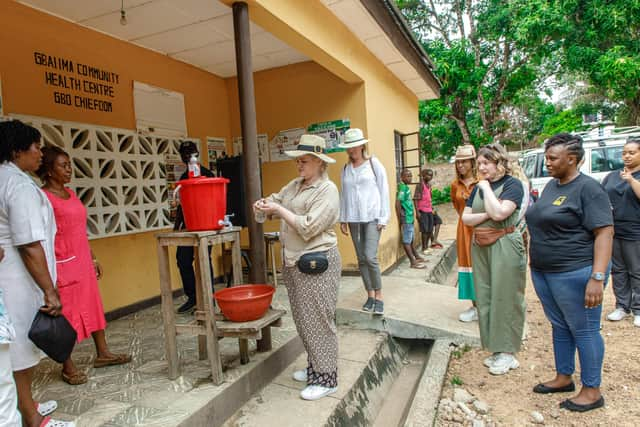‘A trip that will stay with me forever’ – Gosport MP Caroline Dinenage on seeing how UK aid money is spent amid poverty in Africa


In a fascinating account of her three-day trip, here the politician tells The News readers about what she discovered...
‘As an MP I frequently receive emails from local people on the subject of the UK’s international aid spending.
Advertisement
Hide AdAdvertisement
Hide AdNot enough…..too much….wrong priorities…..wrong countries…..everyone has an opinion, and not always based on solid evidence.


I’m almost certainly guilty of that too. So, when I was invited to join the Coalition for Global Prosperity and International Rescue Committee on a trip to Sierra Leone to see for myself how some of our UK aid money is spent, particularly on projects which support women and children, I decided it was time to educate myself.
I didn’t know what to expect. By global standards Sierra Leone is a poor country - the last 30 years have not been kind to this former British colony. A brutal civil war, a devastating Ebola outbreak and the Covid pandemic have all taken their toll. Thirty six per cent of its population live in ‘extreme poverty’ (less than $2 US per day.)
The Saving Lives in Sierra Leone programme, funded by the UK taxpayer via the Foreign, Commonwealth, and Development Office (FCDO), supports the Government of Sierra Leone to increase access to quality reproductive, maternal, newborn, and adolescent health services. The International Rescue Committee (IRC) is the not for profit organisation who lead on this. Their work includes training and mentorship programs to improve standards of care and key services such as blood banks and family planning.
Advertisement
Hide AdAdvertisement
Hide AdWhen the project started in 2019, the country had an incredibly high maternal mortality rate of 717 per 100,000, and an infant mortality rate of 122 per 1000.


The work has already had a positive impact, reducing the maternal mortality rate to 443 per 100,000 by 2022, and it continues to fall.
Our trip took us four hours drive from the capital city of Freetown, along an unexpectedly decent highway funded by the Chinese state (I will return to this point later), to Gbaiima Songa Health Centre in the Kartomahum area, a rural community not far from the second largest city, Bo.
It’s hard to convey what I saw. A small team of remarkable local midwives offer the best possible level of care within the constraints of incredibly basic facilities - an old, cramped building, with intermittent electricity, unreliable running water and no toilet facilities.
Advertisement
Hide AdAdvertisement
Hide AdThe Delivery Room just about accommodates two beds with little space to manoeuvre. The one set of delivery equipment (scalpels, forceps etc) has become quite blunt.


I asked what women in labour might expect in the way of pain relief. The midwife attempted to reassure me - if things got really bad, they could issue paracetamol.
UK aid has helped up-skill and mentor these midwives, and provided solar electricity so they no longer have to support women who go into labour at night with the lights from their mobile phones.
The same day the IRC were also running a ‘blood-drive’ - with booming speakers blasting catchy dance music to attract local people to the Community Health Centre to donate blood.
Advertisement
Hide AdAdvertisement
Hide AdIn the UK we often take for granted the vital blood supplies in our local hospitals which are key to saving lives.
In Sierra Leone, one in every 31 women under the age of 50 die of preventable illnesses, most commonly maternity issues like post-partum haemorrhage.
Yet, until quite recently, if a patient needed blood they would have to take a family member into hospital with them to provide it.
UK aid money is assisting IRC to build blood-bank supplies - in fact 35% of the blood stocks in Sierra Leone have been captured this way. And they are doing a great job persuading people in these rural communities to participate. We spoke to a local teacher who was giving blood because he realised how vital it would be to have sufficient supplies in the local hospital if his pupils were ever in need.
Advertisement
Hide AdAdvertisement
Hide AdThe following day we visited the major hospital in Bo and saw the maternity triage, delivery room, high dependency ward and operating theatre.
Once again, I was struck by the professionalism and dedication of the staff, in unimaginable working conditions. Five hundred doctors cover the whole of Sierra Leone (population around 8.4m in 2021) - about as many as the Portsmouth hospitals region. Fifty per cent of hospital staff are volunteers.
Agnes, cheery and efficient in her starched white dress, is the kind of Head Matron any hospital in the world would be lucky to have. She told us proudly how she had studied in the UK. Buildings are hot, cramped and crumbling, power-cuts common.
Sometimes I receive angry emails equating the state of British hospitals to a third world country. From now on, I will firmly offer reassurance to the contrary.
Advertisement
Hide AdAdvertisement
Hide AdOur three-day whistle-stop visit also took us to see women and girls protection and empowerment programmes in action. These projects challenge harmful traditional norms and increase opportunities for girls and women by supporting community members to combat practices such as early and forced marriage, female genital mutilation (FGM), and denial of education.
We were welcomed to the village by a large gathering of brightly dressed women and girls, singing and dancing. We sat down to talk to them. We spoke of their dreams and aspirations - nursing, law, even a couple of politicians, although maybe that was just for my benefit!
Yet so many of them were mothers while still children themselves. We met a 19-year-old widow, she already had three children.
The Sierra Leone government have recently overturned legislation which prohibited pregnant girls from continuing their education, under a new ‘Radical Inclusion’ policy advocated by the country’s impressive young Education Minister, David Sengeh (who we also met with).
Advertisement
Hide AdAdvertisement
Hide AdBut in reality, the vast majority of older girls we met in this rural area were not able to attend Secondary school.
The IRC’s Girl Shine Program, funded by UK aid, reflects the day-to-day realities that girls and young women face and helps mentor them with the life skills to tackle them.
Reflecting on my short visit; Sierra Leone is a country bursting with potential - fertile land, abundant fishing waters, rich in minerals and natural resources, with long, white sandy beaches.
Yet recent history has dealt this country and its residents blow after blow. I’ve never experienced poverty on this scale, or such a determination from within to address it.
Advertisement
Hide AdAdvertisement
Hide AdIn meetings with Ministers and others, I was struck by the special bond they feel with the UK, not only as their biggest aid partner but our shared historical links.
Waiting in the wings are the Chinese (remember that impressive highway?) who are building relationships and funding massive infrastructure projects across Africa, no doubt with a close eye on their natural resources.
I saw for myself how UK aid saves and changes lives in the short term, but also how it has the potential to help lift countries out of poverty and foster strong partnerships across the globe.
It’s a trip that will stay with me forever.’